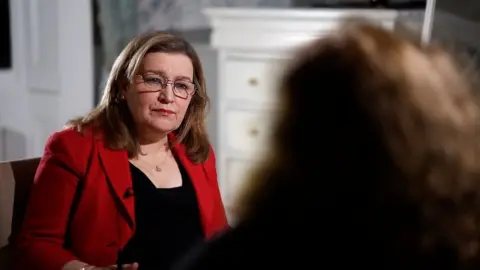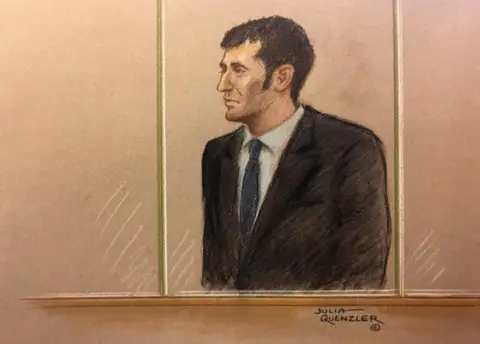David Carrick: Officer raped by disgraced PC feared reporting him to bosses
 BBC
BBCSerial rapist and disgraced former police officer David Carrick will be sentenced this week for his crimes, which spanned 17 years. One of his earliest victims, "Michelle", tells how she feared she would not be believed if she had reported his crime.

"Charming, very charming, very jolly, very happy. Initially that's what I thought. He became quite flirty straight away," Michelle, who asked us not to use her real name, remembers of their first meeting in 2004, while on a three-month secondment.
At the time Michelle was 38 and Carrick 10 years younger. He had only just finished his probation with the Metropolitan Police. He was "a little bit sort of a Jack the Lad. For the length of service he had, I was surprised he was so confident", Michelle remembers.
They worked long hours and became close. Sometimes he stayed at her place, sleeping on the sofa, just to get his head down before getting back to work, she thought. She was not sure whether they would continue seeing each other once the secondment was over.
One night, she went back to his house after working late and it was there he raped her.
"I sort of got pushed around and forced," says Michelle. "I wouldn't class it as violence, but also it's force and I had to put up with it. I'm a police officer, I know exactly the definition of a rape and I know no means no... and because he kept saying yes, I know he'd heard me say no. But he did it anyway, he didn't care."
 Julia Quenzler / BBC
Julia Quenzler / BBCFrom then, she kept her distance, telling him: "This isn't going to happen again."
But she also kept silent. She never brought the subject up with any of her colleagues "and I certainly wasn't going to report it".
She feared she would not be believed and would forever be known as the female colleague who "alleges rape".
Shut in boot
"The culture of the Met then and for some time afterwards was quite male-dominated. It was a bit Life on Mars," she says, referencing the BBC TV series about 1970s policing. She remembers being closed in the boot of a patrol car "for half a shift as a joke" and driven to blue-light calls.
"That's what they did to a lot of the females as they joined."
They also used a "Property of the Met", rubber stamp on female officers to mark "various parts of the anatomy".
"It was done in a laughing, joking way and most officers just went along with it," she remembers.
Michelle did not see Carrick again until, one day in 2021, he popped up on the office TV screen.
"I glanced up and recognised him instantly."
He had been charged after a woman reported a rape in a hotel room to police in Hertfordshire. Michelle was horrified and told a senior officer: "This is what happened to me. I'm fairly certain we're talking about the same man."

By then, better support for female officers had belatedly made it easier for her to report the rape without fearing for her career. She was still hesitant, but felt she owed it to the first victim and, as more women came forward, felt guilty she had not done it sooner.
"This is what I'm paid to do, I protect people. So it was just, yeah, I'd let them down, so I needed to stand up and do my bit."
Finally reporting it was a relief and all the detail came back, Michelle says.
She remembers Carrick would sometimes stand next to her and grab her round the waist while she was delivering briefings. At the time she says she was flattered, but now sees it as unprofessional and controlling.
'He needs to pay'
Michelle says the rape clouded the rest of her life, despite her attempts to put it behind her.
"I'm not a man-hater in any way whatsoever. However, I lack trust and if I get close to a man, I back off. I didn't have the family life that I wanted and I'm much older now and I just haven't had it. I can't say to be sure it was him but it all happened afterwards.
"It was a traumatic experience and it changed how I felt. I didn't want to feel I was ever going to be in that position again."
As one of Carrick's victims but also an officer in a force under unparalleled scrutiny, Michelle has experienced both sides.
"I get the public's distrust," she says but also urges people to think of the thousands of good police officers "still having to work with the bad morale and press not respecting them but still do the job, trying to protect the public. I class myself as one of those".
Michelle plans to be in court for Carrick's sentencing: "He's had his many years of doing what he shouldn't do, being a monster. He is a monster, and now he needs to pay."
"I don't want to hear his name any more," she adds.
Jailing Carrick will not help her forget what he has done, she says, but: "It will give the victims, as well as myself, a bit of justice."
